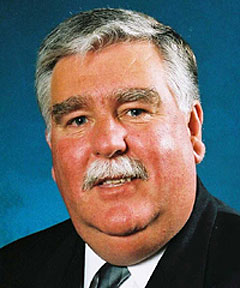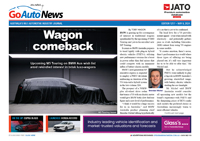Make / Model Search
News - General NewsNSW goes it alone on anti-car theft bansBent operators: NSW is planning to ban re-registration of written-off vehicles to thwart car thieves. Fears that cars stolen in NSW will be re-birthed interstate to beat write-off bans19 Apr 2010 By PHILIP LORD AN impending ban on re-registration of repairable written-off (RWO) vehicles in New South Wales will create jurisdiction headaches and increase cross-border vehicle thefts, according to the National Motor Vehicle Theft Reduction Council (NMVTRC). Executive director Ray Carroll said the NMVTRC was not against the bans, but believed the unilateral move to ban RWOs in NSW from August would have implications for other states. “We’re not critical of what the NSW government has done we’ve just tried to highlight the problems with it,” he said. “NSW has quite a slice of repairable write-offs presenting for re-registration. However, the other jurisdictions don’t believe in a total ban.” By the NMVTRC’s figures, NSW contributed the largest number of stolen-not-recovered vehicles to Australia’s total in 2008. Close to a third of all thefts in NSW were profit-motivated 80 per cent of vehicles targeted were made before 2004 and half of the nation’s profit-motivated theft was in NSW. Authorities suspect many of these vehicles are RWOs fixed using parts from stolen cars and onsold for a profit once repaired and re-registered. The RTA estimates that 60 per cent of the 20,000 repairable write-offs returning to the road per year have dubious repairs and that most of the people presenting at RTA branches to re-register such cars were not in the RTA customer service officers’ experience those typically associated in the motor repair trade.  Left: NSW roads and transport minister David Campbell. Left: NSW roads and transport minister David Campbell.Mr Carroll said the ban was unlikely to significantly reduce crime in NSW while criminal networks could steal vehicles in NSW and launder them elsewhere. It was highly unlikely other states and territories would be able to refuse some NSW written-off vehicles for registration. NSW vehicles that would have been deemed repairable write-offs will pass the other states’ repairable write-off requirements, despite appearing on the national database as statutory write-offs. Mr Carroll said this created a legislative inconsistency that would open avenues for thieves to exploit. He said other states would have to either move to adopt NSW’s proposal or allow registration of NSW write-offs in accordance with their own criteria – despite being a signatory to an agreement not to allow the registration of statutory write-offs from other states. “Already 40 per cent of repairable write-offs presenting for registration do so other than the state they were written off in,” Mr Carroll said. Yet the NSW government said the ban involved wide consultation with other states and the NMVTRC. A spokesman for NSW roads and transport minister David Campbell said: “The RTA consulted extensively with other jurisdictions in developing its proposals via its discussion paper on improving written-off vehicle management and via the national vehicle registration and licensing forum of Austroads.” The minister’s spokesman also pointed to a NMVTRC study two years ago – Review Of The Management Of Written-off Vehicles Preliminary Report October 2008 – that concluded a ban would be financially beneficial to insurers and vehicle owners. “The National Motor Vehicle Theft Reduction Council's national review of written-off vehicles during 2008 concluded that a complete ban on the re-registration of repairable write-offs would provide the highest national financial benefit to vehicle owners and insurers,” the spokesman said. However, NMVTRC strategy and programming director Geoff Hughes said that while the council believed its cost analysis provided the best figures available, it required a leap of faith by insurance companies. It was, he said, an “informed estimation” rather than a guaranteed result. Those companies potentially most affected by the decision – insurance companies and auction houses – were not willing to comment on the ban. Insurance companies NRMA and GIO said through their respective media departments that they did not wish to comment until they had seen full details of the legislation. ManheimFowles, one of two principal auction houses in Australia that sells WROs on consignment from insurance companies, did not wish to comment. ManheimFowles communications manager Mathew McAuley added that RWOs accounted for about 70 per cent of the company’s salvage sales in NSW. While re-birthing once involved transferring identification numbers from a written-off vehicle to an identical stolen vehicle, Mr Carroll said improvements in detection had almost completely eradicated this form of re-birthing. Instead thieves swap parts from a stolen vehicle to a legitimately purchased RWO – which can be purchased at a salvage auction for as little as 20 per cent of its undamaged market value – and then make a profit on-selling the complete, re-registered car. The cost of the stolen vehicle’s parts – up to tens of thousands of dollars – effectively represented the thieves’ profit margin. Mr Carroll said the NSW government’s system was burdened by the large quantity of RWOs presented for registration in NSW – around 20,000 per year – and that police had discovered that criminals manipulated the RTA’s RWO checks, such as obtaining forged receipts for repair parts, which required enormous resources to verify. Through our contact with the police, we’ve discovered there’s quite an active trade in forged receipts,” he said. The end of the RWO scheme in NSW from August means all light vehicles, including motorcycles, trailers and caravans, deemed not repairable by the insurance assessor will automatically be classified as statutory write-offs, which means they are never again to be registered in any state. Exemptions to the ban include rare enthusiasts’ vehicles, specified high value vehicles, collector’s vehicles and those with sentimental value (such as an heirloom or gift). The exemption will be based on market value or a declaration from the customer (based on policy requirements). Exemptions will also be allowed for hail-damaged RWOs if kept by the same owner following hail damage.  |
Click to shareGeneral News articlesResearch General News Motor industry news |









Facebook Twitter Instagram